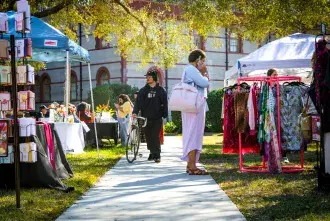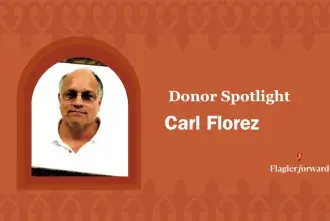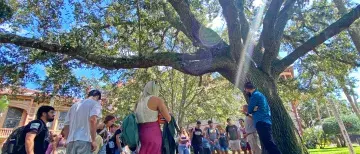
It was near the end of the semester, just a couple of weeks before their students were expected to do the same. This “eulogy assignment” is the final task these professors offer in their class, “A Life Well Lived,” which they co-created as an interdisciplinary survey of philosophical and religious perspectives on fulfillment.
“Their final exam is to write their own eulogy from the perspective of their very closest friend,” Forbes said. “The idea is: you die of old age, and you need to reverse engineer and construct a vision for a good life.”
Within their eulogy, Forbes encourages students to “engage the traditions” that the class is centered around: Judaism, Christianity, Stoicism, and Aristotle’s philosophy. He said they could reference topics like the Jewish practice of "keeping the Sabbath" to highlight the importance of diligently setting aside time for family each week, or maybe point to the Stoic value of remaining focused only on what is within our control. They could even describe an altruistic friendship that Aristotle would have seen as “based on goodness.”
These are just a few examples of the habits, activities, commitments, relationships, and experiences that Forbes and Capes pose to the students as elements of “A Life Well Lived.”
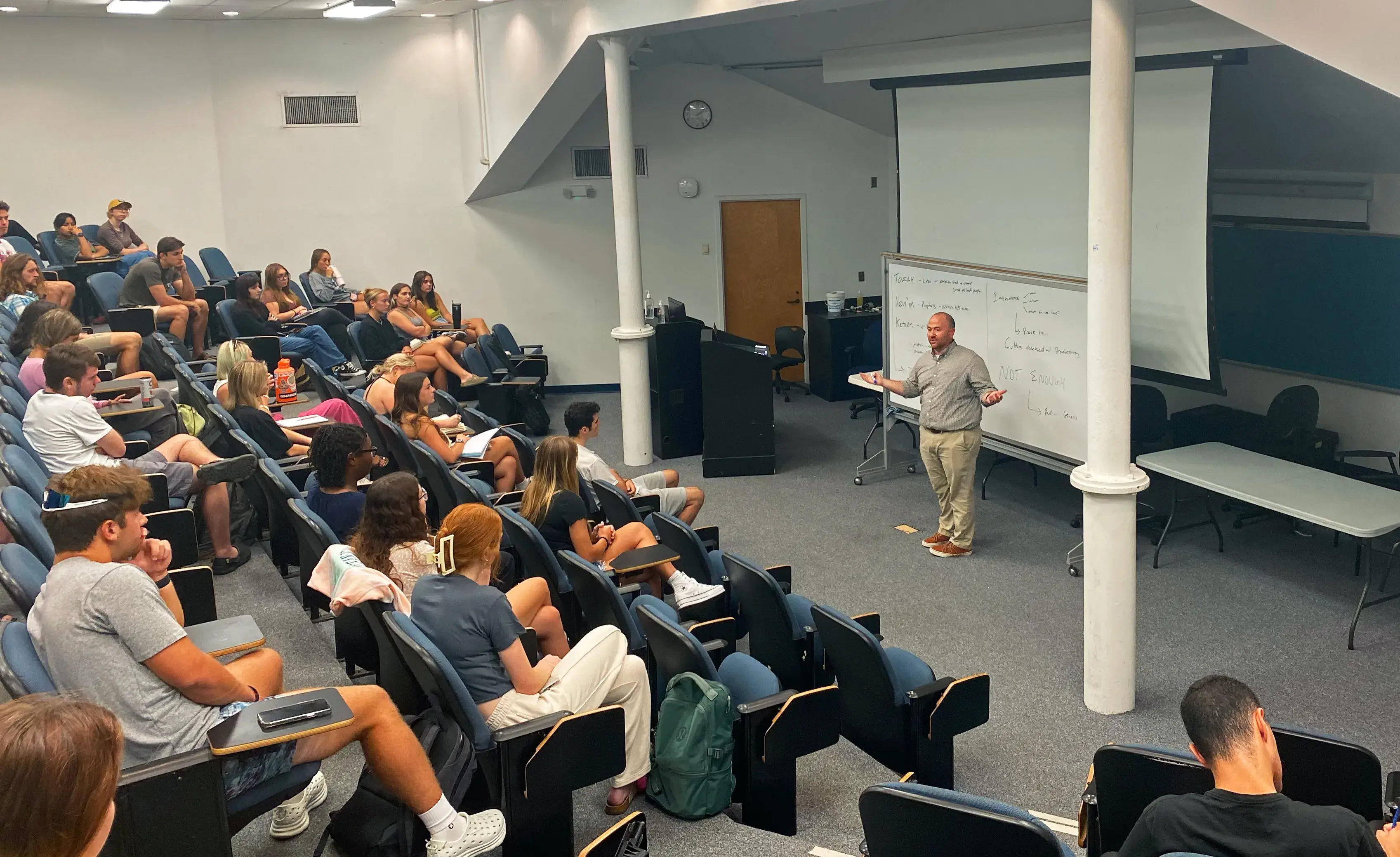
“We wanted part of the theme of the class to be looking at ancient traditions and seeing what sort of pearls of wisdom we, in contemporary life, can glean to help us think better about how to live life well,” Capes said.
Currently offered as an ethical reasoning course among Flagler’s new core curriculum, “A Life Well Lived” was created by Forbes and Capes with influence from similar courses at Yale, Stanford, and Duke. Forbes explained that Yale’s incentive to create such a course came after a trend of unhappiness emerged among their “wildly successful” graduates.
“They're estranged from the people they love the most, and they're miserable, but they're wealthy beyond imagination,” Forbes said. “The problem is that they are broke in other ways that truly matter.”
Forbes said this course is all about giving students the tools to challenge their modern perspectives of success.
“What if you’re really good at climbing the ladder of success only to find that it’s put up against the wrong wall?” he asked.
Alumna Emma Livingston, ‘22, a first-year graduate student at the Princeton Theological Seminary, said one of her major takeaways from the class is a prioritization of friendship. She said, across multiple readings, she was asked to ponder questions like: Who are my friends? How do I love them? How do I care for them?
Livingston said, “A Life Well Lived,” which she took during the Spring of 2022 when it was an offering within her Philosophy and Religion program, helped her practice intentionally placing her time and energy based on what she values most.
“I think about, at the end of my life, what matters, what do I want to have done, who do I want to be?”
She said she looks back on the class with immense gratitude, especially impressed with the professors’ willingness to be vulnerable while exploring these deep-seated concepts with students.
“They both participated in this material just as much as we did,” Livingston said. “I can remember both of them standing up in front of the class offering stories of their own lives.”
As Forbes and Capes developed and continue to instruct this course, their contrasting perspectives and academic backgrounds have proven distinctly valuable. Forbes is a professor of Religion and director of the Youth Ministry Program at Flagler with expertise in Theology, while Capes is a professor of Philosophy with expertise in ethics and metaphysics.
“We already know that we fundamentally disagree on certain things, which creates a little firework fun in class,” Forbes said. “Our job is to provoke good conversation and then to help them reflect.”
Beyond reflection, Forbes and Capes would encourage engagement with these ideas through class exercises and assignments. For example, a week of accountability to one of Aristotle’s virtues they feel weakest in, or the in-class “mini-Sabbath” exercise where students were asked to sit outside in silence for 15-minutes remembering the mantra “before anything, you are created good.”
While the goal is to glean gifts from these traditions, both Forbes and Capes emphasized that they are in no way asking students to adopt these religions or philosophies.
“We’re not asking whether these religious traditions are true or false,” Capes said. “We’re not inviting you to convert to them or reject them. We’re not assessing them, rather we’re reading these traditions to see what we can glean from them about living a good life.”
Skylar Stoffel, a sophomore Social Entrepreneurship and Computer Information Systems major currently taking “A Life Well Lived,” said she appreciated the expectations the professors set in that regard.
“I really like Professor Forbes' philosophy of: ‘We’re going over these different traditions and they may not be beliefs somebody holds, but all of these traditions have things that we can add to our lives without having to take on the whole religion.”
Senior Philosophy and Religion major, Cory Acker, said it was refreshing to see religion and philosophy presented side-by-side like they were in “A Life Well Lived.” She said it gave her insight into the “religious roots in philosophy and the philosophical roots in religion.”
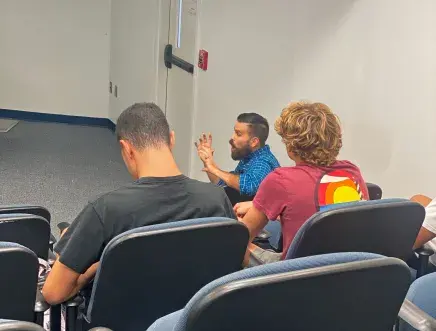
Capes said helping students recognize this overlap is a key function of the course. By “emphasizing the agreements” between Judaism, Christianity, Stoicism, and Aristotle, they hope students will focus on recognizing the common advice to be found among them, like the value in community.
“Whether these traditions are true or false, whether they’re on the whole good or bad, they have something to say about living well,” Capes said.
Selecting traditions to explore was a challenge as Forbes and Capes developed the class.
Capes said Stoicism stood out as an obvious fit for the class because of its overt focus on the similar question, “how do we live a good life?” Aristotle’s “Nicomachean Ethics,” was also well-suited for its focus on “how we flourish as human beings.”
He admitted that narrowing down which religious traditions should be focused on for the course was more difficult, as many religions “speak to question” of how to live life well. However, given Forbes’ expertise in the Judeo-Christian religions, Judaism and Christianity seemed the most fitting.
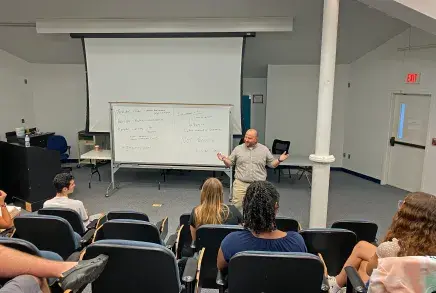
As they designed “A Life Well Lived,” Forbes and Capes said they prioritized making it “wildly interdisciplinary,” hoping students across majors could take advantage of this course. They were also intentional in creating the class around the College’s core value of transformative learning.
“It’s not a removed theoretical exercise,” Forbes said. “There’s teeth in the way you live your life here and now.”
Emma Livingston said she took the nature of this class as an opportunity to find ways to transform her life and she encourages other students to do the same.
“Give your full self to that material, to the readings, and to the other students in the class,” Livingston said. “Allow yourself to be changed by what you read because it will change you. It changed me.”
